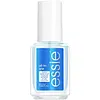What's inside
What's inside
 Key Ingredients
Key Ingredients

 Benefits
Benefits

 Concerns
Concerns

 Ingredients Side-by-side
Ingredients Side-by-side

Ethyl Acetate
PerfumingButyl Acetate
MaskingNitrocellulose
Adipic Acid/Neopentyl Glycol/Trimellitic Anhydride Copolymer
Acetyl Tributyl Citrate
MaskingIsopropyl Alcohol
SolventN-Butyl Alcohol
PerfumingBenzophenone-1
UV AbsorberArgania Spinosa Kernel Oil
EmollientTrimethylpentanediyl Dibenzoate
Panthenyl Triacetate
Tocopheryl Acetate
AntioxidantWater
Skin ConditioningDimethyl Sulfone
SolventPolyvinyl Butyral
Magnesium Ascorbyl Phosphate
AntioxidantCI 77510
Cosmetic ColorantCI 60725
Cosmetic ColorantFish Oil
Skin ConditioningCeramide AP
Skin ConditioningEthyl Acetate, Butyl Acetate, Nitrocellulose, Adipic Acid/Neopentyl Glycol/Trimellitic Anhydride Copolymer, Acetyl Tributyl Citrate, Isopropyl Alcohol, N-Butyl Alcohol, Benzophenone-1, Argania Spinosa Kernel Oil, Trimethylpentanediyl Dibenzoate, Panthenyl Triacetate, Tocopheryl Acetate, Water, Dimethyl Sulfone, Polyvinyl Butyral, Magnesium Ascorbyl Phosphate, CI 77510, CI 60725, Fish Oil, Ceramide AP
Ethyl Acetate
PerfumingButyl Acetate
MaskingNitrocellulose
Adipic Acid/Neopentyl Glycol/Trimellitic Anhydride Copolymer
Acetyl Tributyl Citrate
MaskingIsopropyl PCA
HumectantSucrose Acetate Isobutyrate
Hea Ipdi Isocyanurate Trimer/Polycaprolactone Diol Copolymer
Glycolic Acid
BufferingTris-Hea Ipdi Isocyanurate Trimer
N-Butyl Alcohol
PerfumingEtocrylene
UV AbsorberWater
Skin ConditioningTrimethylpentanediyl Dibenzoate
Malic Acid
BufferingHexanal
MaskingLactic Acid
BufferingPanthenol
Skin ConditioningMagnesium Ascorbyl Phosphate
AntioxidantChamomilla Recutita Flower Extract
MaskingCalcium Pantothenate
Ferrous Gluconate
Skin ConditioningOenothera Biennis Oil
EmollientTocopheryl Acetate
AntioxidantPolyvinyl Butyral
Cucumis Sativus Fruit Extract
EmollientRapeseed Glycerides
EmollientAlcohol Denat.
AntimicrobialCarthamus Tinctorius Seed Oil
MaskingCI 60725
Cosmetic ColorantAllium Sativum Bulb Extract
Skin ConditioningBiotin
AntiseborrhoeicEthyl Acetate, Butyl Acetate, Nitrocellulose, Adipic Acid/Neopentyl Glycol/Trimellitic Anhydride Copolymer, Acetyl Tributyl Citrate, Isopropyl PCA, Sucrose Acetate Isobutyrate, Hea Ipdi Isocyanurate Trimer/Polycaprolactone Diol Copolymer, Glycolic Acid, Tris-Hea Ipdi Isocyanurate Trimer, N-Butyl Alcohol, Etocrylene, Water, Trimethylpentanediyl Dibenzoate, Malic Acid, Hexanal, Lactic Acid, Panthenol, Magnesium Ascorbyl Phosphate, Chamomilla Recutita Flower Extract, Calcium Pantothenate, Ferrous Gluconate, Oenothera Biennis Oil, Tocopheryl Acetate, Polyvinyl Butyral, Cucumis Sativus Fruit Extract, Rapeseed Glycerides, Alcohol Denat., Carthamus Tinctorius Seed Oil, CI 60725, Allium Sativum Bulb Extract, Biotin
Ingredients Explained
These ingredients are found in both products.
Ingredients higher up in an ingredient list are typically present in a larger amount.
Acetyl Tributyl Citrate is a fragrance.
We don't have a description for Adipic Acid/Neopentyl Glycol/Trimellitic Anhydride Copolymer yet.
We don't have a description for Butyl Acetate yet.
This synthetic colorant is used to add a violet color to products. It is water-soluble.
Ethyl Acetate is a fragrance.
Magnesium Ascorbyl Phosphate (MAP) is a form of Vitamin C and is an antioxidant. It can help to reduce redness, improve skin texture, reduce the effects of aging, reduce the visibility of dark spots, and brighten skin.
MAP is created by combining ascorbic acid with magnesium salt. While MAP more gentle on the skin than ascorbic acid, it is thought to be less easily-absorbed into the skin.
Due to MAP's stability up to a pH level of 7, it is more stable to air and sunlight exposure than ascorbic acid. The best pH range for MAP is between 5 and 6.
Like other forms of Vitamin C, MAP has been shown to help reduce hyperpigmentation and simulate collagen production.
As an antioxidant, it helps protect your skin against the signs of aging.
Learn more about Magnesium Ascorbyl PhosphateN-Butyl Alcohol is a fragrance.
We don't have a description for Nitrocellulose yet.
We don't have a description for Polyvinyl Butyral yet.
Tocopheryl Acetate is AKA Vitamin E. It is an antioxidant and protects your skin from free radicals. Free radicals damage the skin by breaking down collagen.
One study found using Tocopheryl Acetate with Vitamin C decreased the number of sunburned cells.
Tocopheryl Acetate is commonly found in both skincare and dietary supplements.
Learn more about Tocopheryl AcetateWe don't have a description for Trimethylpentanediyl Dibenzoate yet.
Water. It's the most common cosmetic ingredient of all. You'll usually see it at the top of ingredient lists, meaning that it makes up the largest part of the product.
So why is it so popular? Water most often acts as a solvent - this means that it helps dissolve other ingredients into the formulation.
You'll also recognize water as that liquid we all need to stay alive. If you see this, drink a glass of water. Stay hydrated!
Learn more about Water